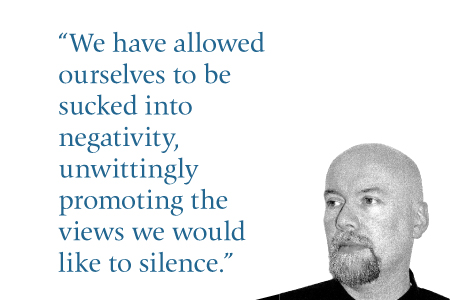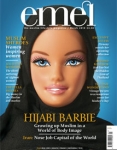
In Praise of Positivity
Issue 66 March 2010
Repeating the mistakes of the Rushdie era by promoting those whose views we most abhor.
When Islam4UK announced they would be organising a demonstration in Wootton Bassett, it prompted an outcry from all corners of society. The Muslim community were outraged at this extreme and completely unrepresentative group’s arrogant presumption to speak for the community. The wider British community were outraged at the insult they felt to the British soldiers who were killed in Afghanistan and to their families. Muslims organised a counter demonstration and the government has since proscribed the group with the intention of removing them as a threat to society as promoters of radicalisation.
While this united response could be interpreted as a praiseworthy act of cohesion, I am left wondering if we would not have been better off simply ignoring this tiny group of irrelevant hotheads. God enjoins us to, “Make due allowance for man’s nature, and enjoin the doing of what is right; and leave alone all those who choose to remain ignorant.” (7:199)
This principle can also be applied to our interaction with the media. In an article on the restoration of links between the British Government and the MCB, the suspension of dialogue was initiated by Hazel Blears who has since left office, a ‘victim’ of the MPs expenses scandal. Her attempt to coerce the MCB into sacking its deputy General-Secretary Daud Abdullah for signing the Istanbul Declaration backfired, generating an upsurge of support for the MCB from the Muslim community who were reassured about the independence of their representative body. In the article, the author chose to highlight the hostile response to the Secretary of State John Denham by a number of journalists and by the Board of Deputies of British Jews, who have published a strongly worded letter attacking his decision.
Once again it seems we have allowed ourselves to be sucked into negativity, unwittingly promoting the views we would like to silence. In a recent survey in the Jewish Chronicle, 83% of respondents supported the restoration of links between the Government and the MCB. Rather than highlighting the usual critics, perhaps we should be focussed on promoting the more balanced and positive response of the ordinary people, represented in this case by the JC’s readership.
We live in a complex and diverse society that frequently stretches our patience and understanding to its limits, and it seems that many Muslims seem confused by the apparently ambiguous nature of the Qur’anic discourse with regard to the People of the Book. To take a concrete example, there is the verse in surah al-Imran that says, “If the followers of earlier revelation had attained to faith, it would have been for their own good; but only a few among them are believers, while most of them are iniquitous.” (3:110) So, how are we to understand God’s intent? Is the message that even though we might meet a sincere and pious Jew or Christian, we should remember that most are bad and treat them all accordingly? Or is it rather that no matter how negative our personal experience may have been, we should always remember that there will be good people amongst them?
As always, we find the answer in the life example of the Prophet Muhammad, whose response to these warnings was to constantly strive to connect with the sincere believers of every community such as the Christians of Abyssinia and Najran. The Qur’an says, “If God had so willed, He could surely have made you all one single community, but [He willed it otherwise] in order to test you by means of what He has vouchsafed unto you. Vie, then, with one another in doing good works.” (5:48)
It is time to stop whinging about the extremists and put our efforts into the positive promotion of truth and justice.
Dawud Bone is the Stone Ashdown Director of the Centre for the Study of Muslim-Jewish Relations at the Woolf Institute of Abrahamic Faiths in Cambridge.
Bookmark this |
|
Add to DIGG |
|
Add to del.icio.us |
|
Stumble this |
|
Share on Facebook |
|
Share this |
|
Send to a Friend |
|
Link to this |
|
Printer Friendly |
|
Print in plain text |
|


Comments
0 Comments